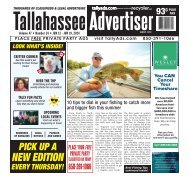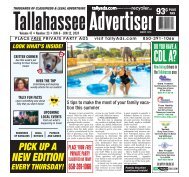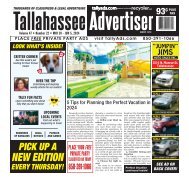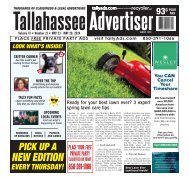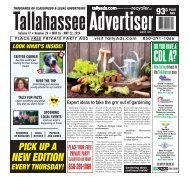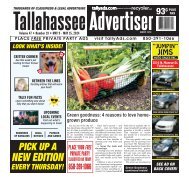TLA37_AllPages
Create successful ePaper yourself
Turn your PDF publications into a flip-book with our unique Google optimized e-Paper software.
members contribute when they visit Capitol Hill.<br />
Martinez acknowledged he was aware coming in that<br />
there are some in trucking who perceive FMCSA in<br />
almost adversarial terms. He has been markedly visible<br />
and available to the trucking public since assuming the<br />
administrator’s post. He said he learned to appreciate<br />
the value of keeping open lines of communication<br />
while he was a state motor vehicle commissioner, first<br />
in New York and then in New Jersey.<br />
“That is my inclination,” Martinez said. It’s how<br />
he got things done, and it was what he envisioned<br />
when he threw his hat into the ring for the FMCSA<br />
post. Fortunately, or maybe it was part of the reason<br />
he got the job, it is a viewpoint shared by his boss,<br />
Secretary of Transportation Elaine Chao. In fact, he<br />
said, it’s something she insists on from all branches of<br />
the DOT, “that we need to engage the industry to get<br />
the best ideas that are out there from the people that<br />
really know what’s going on.”<br />
Breaching the wall some people in trucking have<br />
built about FMCSA needed to be a two-way process,<br />
and Martinez knew he had to be the one to lower the<br />
drawbridge. He recalled less than a month after he<br />
became administrator, he attended his first listening<br />
session at an industry event, “and boy, did I get beat<br />
up.”<br />
The first phase of the ELD mandate was about to go<br />
into full effect after a brief grace period, and that had<br />
already ratcheted up the industrywide conversation<br />
about the need for HOS reform. The crowd gave<br />
it to him with both barrels. Now, he can laugh<br />
when he remembers thinking, “What could I<br />
have possibly done in three weeks” to have<br />
deserved this?<br />
He knew it wasn’t him. “What I<br />
heard was a lot of frustration,<br />
even to the point that they<br />
couldn’t even articulate what<br />
they were so frustrated about,”<br />
Martinez said. “I felt that right<br />
away, the drivers were like, ‘you<br />
don’t know what we do.’<br />
“That’s not healthy for the<br />
industry, and it’s not healthy for<br />
us as a regulator, because it<br />
undermines our mission.”<br />
FMCSA wound up doing five listening sessions<br />
concerning HOS. Part of that was to collect comments,<br />
but it was also to send a message, that the agency<br />
wants input from everyone, not just the guys in the<br />
front office.<br />
“We got to make them feel that, yeah, we’re here,<br />
we’re listening, and it doesn’t all have to be roses<br />
and sunshine,” Martinez said. “Tell us what’s wrong,<br />
because that’s the only way it’s going to get fixed.”<br />
He added that he knew full well what a diverse<br />
industry trucking is, but he never fully appreciated the<br />
extent of that diversity and all the unique challenges<br />
each segment faces.<br />
He also thinks that by being consistently available,<br />
consistently asking for comments, the reception he’s<br />
received at industry events has improved, that there<br />
is an overall acceptance that the agency genuinely<br />
wants as much input as it can get, in every form and<br />
from all quarters.<br />
“I’m asking industry to engage, from the driver level,<br />
safety director level to the C suite folks — give us<br />
your ideas. If you have data, if you have technology<br />
that you think is proving out, tell us what it is so that’s<br />
something we can follow up with.”<br />
Martinez and Heller agreed HOS revision is a great<br />
example of what can be done when people in the<br />
industry are engaged. FMCSA asked for input, and<br />
thousands did so, online and in person.<br />
“We tried to boil it down, and that’s what we articulated<br />
in the Advance Notice of Proposed Rulemaking,”<br />
Martinez said. “And we’ll see what comes out of the<br />
process.”<br />
It may seem like a long, dragged-out process,<br />
Martinez added, and some of that is just built right into<br />
the process. “The reason is to ensure that all parties<br />
can be heard from, and that’s a good thing.”<br />
But, Heller added, here we are, possibly just days<br />
away from an NPRM. Usually, you could expect it to<br />
take two years or more to get this far on something<br />
like this. What’s this taken, eight months? “That is light<br />
speed for government,” Heller said.<br />
It’s important to consider why HOS reform has been<br />
able to move as quickly as it has, and why the push has<br />
happened, Heller said. People have been clamoring for<br />
more flexibility in the HOS rules for 15 years. With the<br />
34 TRUCKLOAD AUTHORITY | www.Truckload.org TCA 2019



